
ACS ES&T Engineering
Scope & Guideline
Transforming Research into Real-World Solutions for Global Challenges.
Introduction
Aims and Scopes
- Environmental Remediation Techniques:
Research on novel methods for the remediation of contaminated environments, including soil and water treatment technologies, utilizing advanced oxidation processes, bioremediation, and electrochemical methods. - Wastewater Treatment Innovations:
Focus on innovative approaches to wastewater treatment, including anaerobic digestion, membrane bioreactors, and electrochemical systems, aimed at improving efficiency and reducing environmental impacts. - Resource Recovery and Waste Valorization:
Studies that explore the conversion of waste materials into valuable resources, such as energy, nutrients, and materials, with an emphasis on sustainability and circular economy principles. - Advanced Material Development:
Research on the development of advanced materials for environmental applications, including nanomaterials and engineered adsorbents, targeting pollutant removal and resource recovery. - Machine Learning and Data-Driven Approaches:
Integration of machine learning and data analytics in environmental engineering to enhance predictive capabilities, optimize processes, and improve decision-making in environmental management. - Sustainable Energy Systems:
Exploration of sustainable energy technologies, including solar-driven processes and energy recovery methods, aimed at reducing environmental footprints and enhancing resource efficiency.
Trending and Emerging
- Electrochemical and Photocatalytic Processes:
There is a rising interest in electrochemical and photocatalytic methods for pollution degradation and resource recovery, driven by their efficiency and potential for sustainable applications. - Microbial Technologies in Waste Treatment:
Research on microbial processes, including anaerobic digestion and bioelectrochemical systems, is gaining momentum as effective strategies for waste treatment and biogas production. - Circular Economy and Sustainable Practices:
A strong emphasis on circular economy principles is evident, with studies focusing on resource recovery, waste valorization, and sustainable practices across various sectors. - Advanced Sensing and Monitoring Techniques:
Emerging trends include the development of advanced sensing technologies for real-time monitoring of pollutants and environmental conditions, enhancing the ability to manage environmental impacts. - Machine Learning Applications:
The integration of machine learning and artificial intelligence in environmental engineering is becoming a key focus, aiding in predictive modeling, optimization, and innovative solutions.
Declining or Waning
- Traditional Chemical Treatments:
Research on conventional chemical treatment methods for pollution control is becoming less prominent, as newer, more sustainable alternatives gain traction. - Single-Focus Studies:
There is a noticeable reduction in studies focusing solely on single pollutants or isolated treatment methods, with a shift towards integrated approaches that address multiple contaminants and processes. - Static Models and Theoretical Frameworks:
The application of static models in environmental processes is waning, as dynamic and adaptive modeling approaches that incorporate real-time data and machine learning are preferred.
Similar Journals
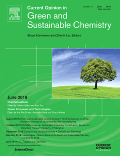
Current Opinion in Green and Sustainable Chemistry
Leading the Charge in Green Chemistry InnovationCurrent Opinion in Green and Sustainable Chemistry, published by Elsevier, is a premier journal dedicated to exploring the rapidly evolving field of green and sustainable practices in chemistry. With an impressive Q1 ranking in multiple categories, including Catalysis, Process Chemistry and Technology, and Waste Management, this journal plays a pivotal role in disseminating innovative research by providing critical insights into sustainable methodologies and their implementation across various industries. The journal aims to gather leading perspectives from experts to facilitate knowledge exchange that drives the global transition towards more sustainable chemical practices. Based in the Netherlands, Current Opinion in Green and Sustainable Chemistry emphasizes high impact, evidenced by its Scopus ranks, notably achieving the 10th percentile in Environmental Science Management, making it indispensable for researchers and professionals keen on advancing sustainable chemistry solutions. This journal offers a blend of open access articles and subscription-based content, ensuring a wide reach and engagement with its audience.
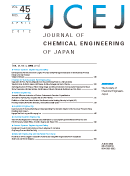
JOURNAL OF CHEMICAL ENGINEERING OF JAPAN
Exploring New Frontiers in Chemical EngineeringJOURNAL OF CHEMICAL ENGINEERING OF JAPAN is a distinguished academic publication in the field of chemical engineering and chemistry, published by Taylor & Francis Ltd. With its ISSN 0021-9592 and E-ISSN 1881-1299, this journal has been a vital resource for researchers and practitioners since its inception in 1968 and continues to provide essential insights and advancements through 2024. The journal operates under an Open Access model as of 2023, promoting wider dissemination of research findings and encouraging collaboration within the global scientific community. Currently categorized in the Q4 quartile for both Chemical Engineering and Chemistry (miscellaneous) in 2023, it ranks within the lower percentiles of its respective fields, offering a platform for emerging scholars to publish their work and gain visibility. As part of Japan's academic landscape, it addresses numerous aspects of chemical engineering, fostering innovation and technical development that contribute to the industry's growth. Engaging with this journal is paramount for those looking to stay informed on the latest research trends and applications in chemical processes.
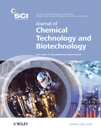
JOURNAL OF CHEMICAL TECHNOLOGY AND BIOTECHNOLOGY
Transforming Ideas into Impactful Solutions in Chemical TechnologyJOURNAL OF CHEMICAL TECHNOLOGY AND BIOTECHNOLOGY, published by WILEY in the United Kingdom, serves as a premier platform for research at the interface of chemical engineering and biotechnology. With an ISSN of 0268-2575 and E-ISSN 1097-4660, this journal has established itself as a crucial resource for scholars and professionals, evidenced by its impactful categorization in the Q1 and Q2 quartiles across multiple domains such as Inorganic Chemistry, Biotechnology, and Renewable Energy. The journal encompasses a broad scope that includes innovative research on sustainable technologies, pollution management, and advances in chemical syntheses, making it essential for those pursuing cutting-edge developments in these disciplines. Researchers and practitioners benefit from its comprehensive coverage, as it includes insightful articles, reviews, and case studies that collectively push the boundaries of contemporary science and engineering. With a ranking of Q2 in its various categories and significant percentiles in key fields, the journal stands as a beacon for high-quality scholarship, eligible for impact in both academia and industry.
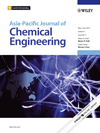
Asia-Pacific Journal of Chemical Engineering
Fostering Interdisciplinary Research for a Sustainable Future.The Asia-Pacific Journal of Chemical Engineering, published by WILEY, serves as a vital forum for the dissemination of innovative research in the interdisciplinary domains of chemical engineering, renewable energy, sustainability, and waste management. Established in 2006, this esteemed journal has achieved a notable impact factor that reflects its commitment to advancing knowledge and practices within the chemical engineering community. With its Q3 category rankings across various fields, including Chemical Engineering (Miscellaneous), Renewable Energy, Sustainability and the Environment, and Waste Management and Disposal, the journal holds a significant position among its peers, assuring readers of quality and relevance in published content. Although it does not offer Open Access options, the Asia-Pacific Journal of Chemical Engineering remains an essential resource for researchers, professionals, and students aiming to stay at the forefront of innovations affecting the Asia-Pacific region and beyond. The journal's broad scope covers diverse topics, making it an integral part of the academic landscape from 2006 to 2024.
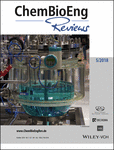
ChemBioEng Reviews
Transforming Ideas into Bioengineered SolutionsChemBioEng Reviews is a premier academic journal dedicated to advancing the fields of biochemistry, bioengineering, and chemical engineering. Published by WILEY-V C H VERLAG GMBH, this journal serves as an essential platform for researchers and professionals seeking to disseminate groundbreaking insights and innovations. With a remarkable impact factor and a solid reputation, it is ranked in the top quartile (Q1) across multiple disciplines, including Biochemistry, Bioengineering, and Industrial and Manufacturing Engineering. The journal's comprehensive scope covers the synthesis, analysis, and application of bioengineered solutions, making it a vital resource for anyone involved in process chemistry and technology. With an unwavering commitment to high-quality scientific discourse from 2014 to 2024, ChemBioEng Reviews is not only pivotal for the academic community but also contributes to industry advancements in filtration, separation processes, and the intersection of chemical and biological engineering.

Environmental Science-Water Research & Technology
Pioneering advancements in environmental water solutions.Environmental Science-Water Research & Technology is a premier journal published by the Royal Society of Chemistry that focuses on the latest research and technological advancements in the field of water science and engineering. Since its inception in 2015, the journal has steadily gained recognition for its rigorous peer-review process and commitment to advancing our understanding of fresh, wastewater treatment, and sustainable water management. With a remarkable 2023 impact factor and consistently achieving Q1 status in both Environmental Engineering and Water Science and Technology categories, this journal ranks within the top percentile of its field, underscoring its pivotal role in fostering innovative solutions to global water challenges. Currently listed as Rank #26/261 in Water Science and Technology and Rank #34/197 in Environmental Engineering by Scopus, it provides an essential platform for researchers, professionals, and students alike. The journal embraces a broad spectrum of topics concerning water research, aiming to bridge the gap between scientific understanding and practical application.
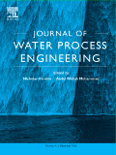
Journal of Water Process Engineering
Uniting Expertise in Water Process Engineering and BiotechnologyJournal of Water Process Engineering, published by Elsevier, stands as a leading authority in the interdisciplinary fields of Biotechnology, Process Chemistry and Technology, and Water Science and Technology. With its ISSN 2214-7144, this journal has established itself since its inception in 2014, reaching its convergence year in 2024. Renowned for its high-impact contributions, it holds a prestigious Q1 ranking in 2023 across multiple categories, including Safety, Risk, Reliability and Quality and Waste Management and Disposal. The journal aims to advance knowledge and practice in water processing, addressing global challenges related to water scarcity, environmental safety, and sustainable technology. While the journal does not currently offer open access options, it remains a vital resource for researchers, professionals, and students dedicated to advancing water process engineering and management practices. By disseminating innovative research and methodologies, the Journal of Water Process Engineering plays a crucial role in shaping future technologies and strategies essential for water sustainability.

Green Chemical Engineering
Innovating chemical engineering for a sustainable future.Green Chemical Engineering, an esteemed journal published by KEAI PUBLISHING LTD, plays a pivotal role in advancing the field of sustainable chemical engineering. With an Open Access policy since 2020, this journal facilitates the free exchange of cutting-edge research and innovations that address critical environmental challenges. Based in China, it has rapidly gained recognition with impressive category quartiles, ranking Q1 in numerous relevant fields including Catalysis, Chemical Engineering (miscellaneous), Filtration and Separation, and Process Chemistry and Technology. Its presence in Scopus highlights its significance, with top rankings (e.g., Rank #4/19 in Filtration and Separation) placing it in the upper echelons of chemical engineering literature. Designed for researchers, professionals, and students alike, Green Chemical Engineering aims to foster a collaborative platform for the dissemination of pioneering work that contributes to a greener and more sustainable future.

ENVIRONMENTAL ENGINEERING SCIENCE
Catalyzing change through cutting-edge environmental research.ENVIRONMENTAL ENGINEERING SCIENCE is a leading journal published by MARY ANN LIEBERT, INC that provides a platform for pioneering research in the fields of environmental chemistry, pollution control, and waste management. With an ISSN of 1092-8758 and an E-ISSN of 1557-9018, this peer-reviewed journal aims to disseminate high-quality scientific studies that address critical environmental challenges. As evidenced by its 2023 category quartile rankings, it holds a notable position at Q3 in Environmental Chemistry and Pollution and Q2 in Waste Management and Disposal, highlighting its relevance and impact in these domains. Spanning over two decades from 1997 to 2024, the journal is dedicated to fostering innovations and promoting rigorous scholarship that can contribute significantly to sustainable environmental practices globally. Authors and researchers are encouraged to engage with this essential resource, which offers Open Access options to enhance the visibility and reach of their work. For those interested in advancing their understanding and practice within the environmental sciences, ENVIRONMENTAL ENGINEERING SCIENCE is an indispensable journal to consider.
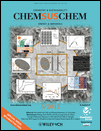
ChemSusChem
Pioneering Research for a Greener FutureChemSusChem is a premier interdisciplinary journal, published by WILEY-V C H VERLAG GMBH, that focuses on the critical fields of Chemical Engineering, Energy, Environmental Chemistry, and Materials Science. Since its inception in 2008, the journal has consistently maintained a Q1 ranking across multiple categories, highlighting its role as a vital resource for researchers and professionals dedicated to advancing sustainable chemical processes and technologies. With an impressive impact factor, it ranks 12th in General Chemical Engineering and is highly regarded within its scopes, indicating the journal's commitment to publishing high-quality, innovative research that addresses global challenges in energy and environmental sustainability. Though it operates on a subscription model, its contributions are essential for those in academia and industry seeking cutting-edge developments in sustainable chemistry. As it approaches its convergence span through 2024, ChemSusChem continues to shape the future of sustainable chemistry, making it a must-read for students, researchers, and practitioners alike.